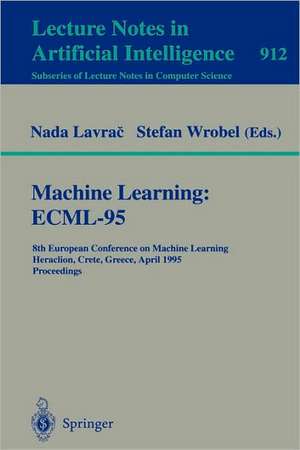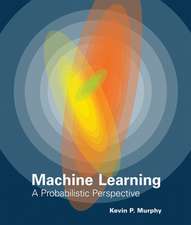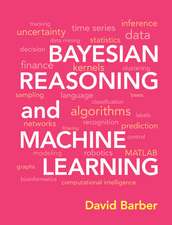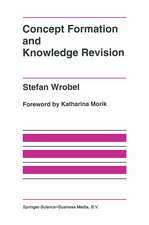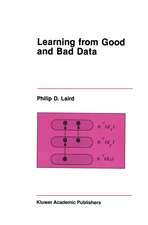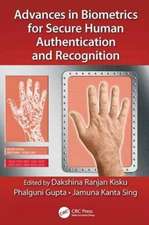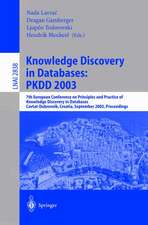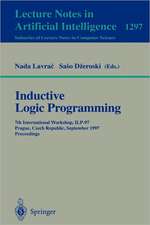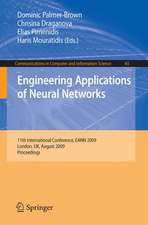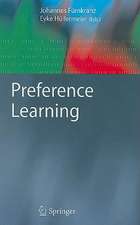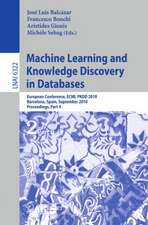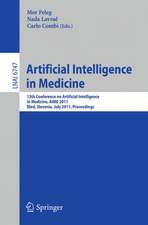Machine Learning: ECML-95: 8th European Conference on Machine Learning, Heraclion, Crete, Greece, April 25 - 27, 1995. Proceedings: Lecture Notes in Computer Science, cartea 912
Editat de Nada Lavrač, Stefan Wrobelen Limba Engleză Paperback – 5 apr 1995
Besides four invited papers the volume presents revised versions of 14 long papers and 26 short papers selected from a total of 104 submissions. The papers address all current aspects in the area of machine learning; also logic programming, planning, reasoning, and algorithmic issues are touched upon.
Din seria Lecture Notes in Computer Science
- 20%
 Preț: 1061.55 lei
Preț: 1061.55 lei - 20%
 Preț: 307.71 lei
Preț: 307.71 lei - 20%
 Preț: 438.69 lei
Preț: 438.69 lei - 20%
 Preț: 579.30 lei
Preț: 579.30 lei -
 Preț: 410.88 lei
Preț: 410.88 lei - 17%
 Preț: 427.22 lei
Preț: 427.22 lei - 20%
 Preț: 596.46 lei
Preț: 596.46 lei - 15%
 Preț: 448.04 lei
Preț: 448.04 lei - 20%
 Preț: 353.50 lei
Preț: 353.50 lei -
 Preț: 389.49 lei
Preț: 389.49 lei - 20%
 Preț: 309.90 lei
Preț: 309.90 lei - 20%
 Preț: 645.28 lei
Preț: 645.28 lei - 20%
 Preț: 763.23 lei
Preț: 763.23 lei - 15%
 Preț: 580.46 lei
Preț: 580.46 lei - 20%
 Preț: 310.28 lei
Preț: 310.28 lei - 20%
 Preț: 655.02 lei
Preț: 655.02 lei - 20%
 Preț: 1183.14 lei
Preț: 1183.14 lei - 20%
 Preț: 340.32 lei
Preț: 340.32 lei -
 Preț: 449.57 lei
Preț: 449.57 lei - 20%
 Preț: 591.51 lei
Preț: 591.51 lei - 18%
 Preț: 938.83 lei
Preț: 938.83 lei - 20%
 Preț: 337.00 lei
Preț: 337.00 lei - 20%
 Preț: 649.50 lei
Preț: 649.50 lei - 20%
 Preț: 607.40 lei
Preț: 607.40 lei - 20%
 Preț: 1414.79 lei
Preț: 1414.79 lei - 20%
 Preț: 1024.44 lei
Preț: 1024.44 lei - 20%
 Preț: 583.40 lei
Preț: 583.40 lei - 20%
 Preț: 453.32 lei
Preț: 453.32 lei - 20%
 Preț: 575.49 lei
Preț: 575.49 lei - 20%
 Preț: 1075.26 lei
Preț: 1075.26 lei - 20%
 Preț: 585.88 lei
Preț: 585.88 lei - 20%
 Preț: 825.93 lei
Preț: 825.93 lei - 17%
 Preț: 360.20 lei
Preț: 360.20 lei - 20%
 Preț: 763.23 lei
Preț: 763.23 lei - 20%
 Preț: 340.32 lei
Preț: 340.32 lei - 20%
 Preț: 504.58 lei
Preț: 504.58 lei - 20%
 Preț: 369.13 lei
Preț: 369.13 lei - 20%
 Preț: 580.93 lei
Preț: 580.93 lei - 20%
 Preț: 343.62 lei
Preț: 343.62 lei - 20%
 Preț: 350.21 lei
Preț: 350.21 lei - 20%
 Preț: 583.40 lei
Preț: 583.40 lei - 20%
 Preț: 583.40 lei
Preț: 583.40 lei - 15%
 Preț: 438.59 lei
Preț: 438.59 lei - 20%
 Preț: 341.95 lei
Preț: 341.95 lei - 20%
 Preț: 238.01 lei
Preț: 238.01 lei - 20%
 Preț: 538.30 lei
Preț: 538.30 lei
Preț: 336.86 lei
Preț vechi: 421.08 lei
-20% Nou
Puncte Express: 505
Preț estimativ în valută:
64.47€ • 67.06$ • 53.22£
64.47€ • 67.06$ • 53.22£
Carte tipărită la comandă
Livrare economică 14-28 aprilie
Preluare comenzi: 021 569.72.76
Specificații
ISBN-13: 9783540592860
ISBN-10: 3540592865
Pagini: 388
Ilustrații: XII, 376 p.
Dimensiuni: 155 x 235 x 20 mm
Greutate: 0.54 kg
Ediția:1995
Editura: Springer Berlin, Heidelberg
Colecția Springer
Seriile Lecture Notes in Computer Science, Lecture Notes in Artificial Intelligence
Locul publicării:Berlin, Heidelberg, Germany
ISBN-10: 3540592865
Pagini: 388
Ilustrații: XII, 376 p.
Dimensiuni: 155 x 235 x 20 mm
Greutate: 0.54 kg
Ediția:1995
Editura: Springer Berlin, Heidelberg
Colecția Springer
Seriile Lecture Notes in Computer Science, Lecture Notes in Artificial Intelligence
Locul publicării:Berlin, Heidelberg, Germany
Public țintă
ResearchCuprins
Reasoning and learning in probabilistic and possibilistic networks: An overview.- Problem decomposition and the learning of skills.- Machine learning in the world wide web.- Abstract computer models: Towards a new method for theorizing about adaptive agents.- Learning abstract planning cases.- The role of prototypicality in exemplar-based learning.- Specialization of recursive predicates.- A distributed genetic algorithm improving the generalization behavior of neural networks.- Learning non-monotonic logic programs: Learning exceptions.- A comparative utility analysis of case-based reasoning and control-rule learning systems.- A minimization approach to propositional inductive learning.- On concept space and hypothesis space in case-based learning algorithms.- The power of decision tables.- Pruning multivariate decision trees by hyperplane merging.- Multiple-Knowledge Representations in concept learning.- The effect of numeric features on the scalability of inductive learning programs.- Analogical logic program synthesis from examples.- A guided tour through hypothesis spaces in ILP.- JIGSAW: Puzzling together RUTH and SPECTRE (Extended abstract).- Discovery of constraints and data dependencies in relational databases (Extended abstract).- Learning disjunctive normal forms in a dual classifier system (Extended abstract).- The effects of noise on efficient incremental induction (Extended abstract).- Analysis of Rachmaninoff's piano performances using inductive logic programming (Extended abstract).- Handling real numbers in ILP: A step towards better behavioural clones (Extended abstract).- Simplifying decision trees by pruning and grafting: New results (Extended abstract).- A tight integration of pruning and learning (Extended abstract).- Decision-tree based neural network (Extended abstract).- Learning recursion with iterative bootstrap induction (Extended abstract).- Patching proofs for reuse (Extended abstract).- Adapting to drift in continuous domains (Extendedabstract).- Parallel recombinative reinforcement learning (Extended abstract).- Learning to solve complex tasks for reactive systems (Extended abstract).- Co-operative Reinforcement Learning by payoff filters (Extended abstract).- Automatic synthesis of control programs by combination of learning and problem solving methods (Extended abstract).- Analytical learning guided by empirical technology: An approach to integration (Extended abstract).- A new MDL measure for robust rule induction (Extended abstract).- Class-driven statistical discretization of continuous attributes (Extended abstract).- Generating neural networks through the induction of threshold logic unit trees (Extended abstract).- Learning classification rules using lattices (Extended abstract).- Hybrid classification: Using axis-parallel and oblique subdivisions of the attribute space (Extended abstract).- An induction-based control for genetic algorithms (Extended abstract).- Fender: An approach to theory restructuring(extended abstract).- Language series revisited: The complexity of hypothesis spaces in ILP (Extended abstract).- Prototype, nearest neighbor and hybrid algorithms for time series classification (Extended abstract).
